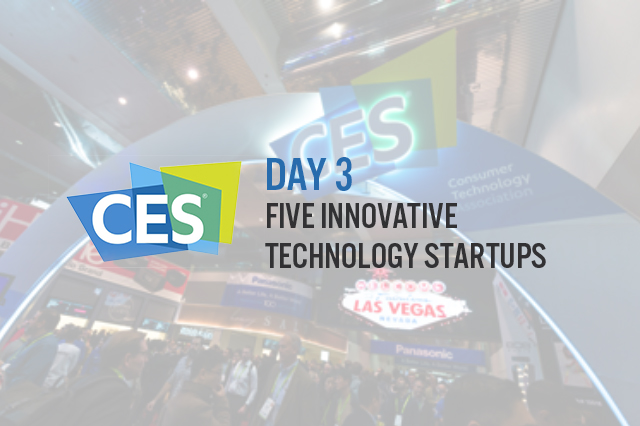
albert Chan
1. Temi. We’re used to seeing companies turn up at CES to present robotics for consumer use; most are in early stages of development. We were happy to see one we can buy today: The Temi Robot is available for pre-order today and provides many useful functions. Temi is a personal robot with a 10-inch tablet for a head that can play videos and music, control smart home devices, wirelessly charge devices and make calls. The company announced at CES that it plans to integrate Amazon’s Alexa voice assistant. A user could say “Alexa, go check if I left my hat in the kitchen,” just one potential task a robot with virtual assistant capabilities combined with autonomous navigation skills could perform. Temi is available for pre-order today for $1,499 in the US and the company expects to begin shipping by March.
[caption id="attachment_59014" align="aligncenter" width="984"]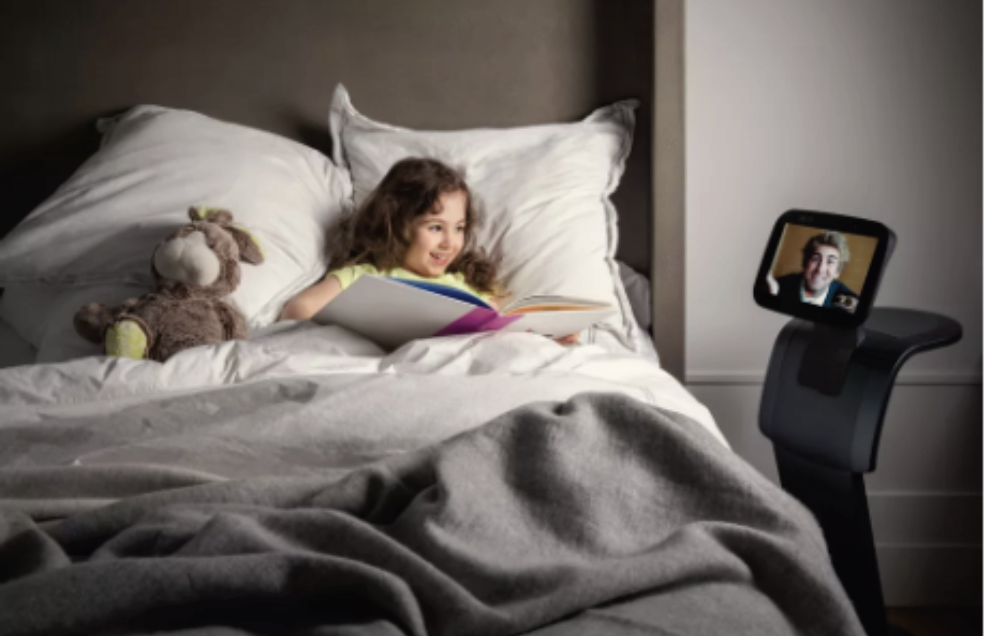 Temi Robot
Temi Robot
Source: Temi[/caption] 2. Flint Rehab, a neuro-rehabilitation device company, unveiled a new wearable product called MiGo. MiGo is a wearable activity tracker specifically designed for stroke survivors. Strokes are one of the largest causes of adult disability, affecting over seven hundred thousand people every year, according to the CDC. The device is worn around the wrist, tracking movement patterns to make suggestions to help exercise the wearer’s impaired side as much as possible. The device pairs with an app, which provides activity goals based on the wearer’s movement ability. While most wearable fitness trackers are designed to help people get into shape, MiGo can help stroke survivors regain lost abilities. 3. Techstars hosted a pitch competition that featured several innovative startup solutions. Pix has developed a “smart backpack” that allows you to put customized pixelated electronic images on the back of your backpack. The company launched a crowdfunding campaign to raise $35,000 and ended up receiving over $150,000. Pix believes the product will resonate at festivals, conferences (companies can show their logo), and for consumers wanting to show off their personal style. Users control Pix’s appearance with a mobile app via Bluetooth connectivity. Pix will cost $200 for those who pro-order on Kickstarter and $260 retail. [caption id="attachment_59016" align="aligncenter" width="542"]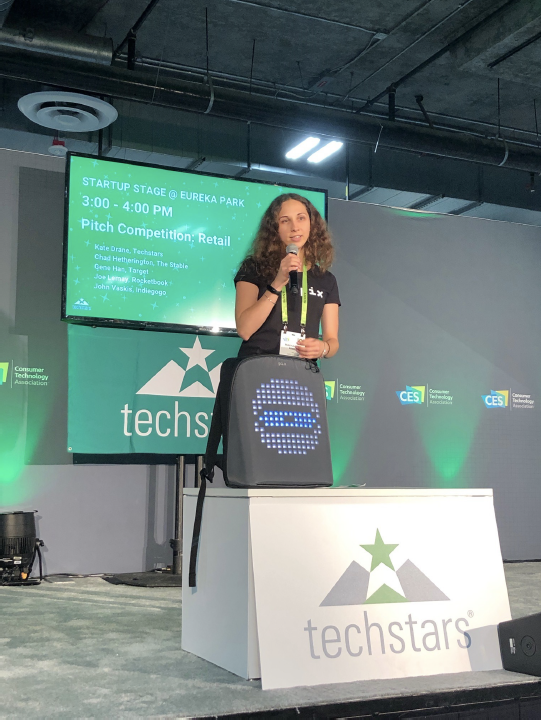 Pix Presentation at Techstars Retail Pitch Event
Pix Presentation at Techstars Retail Pitch Event
Source: Coresight Research[/caption] 4. Origami Labs, a company that also participated in the pitch competition, has developed a smart ring wearable that answers phone calls, send and receives text messages and performs commands such as asking for the weather or setting a reminder — any task a Siri or Google Assistant could do. Through Bluetooth connectivity, the ring connects with the wearers smartphone allowing you to use your smartphone’s built-in voice assistant. The user places their ringed finger to their ear to either speak or listen, essentially functioning like a wireless earbud. The ring, called Orii, alerts the wearer with a vibration, then you listen by raising your finger to your ear. The Hong Kong-based startup launched in late 2017, raised $500,000 in crowdfunding, $2.5 million in funding and has sold 10,000 units at a price of about $100 per ring. [caption id="attachment_59017" align="aligncenter" width="1050"]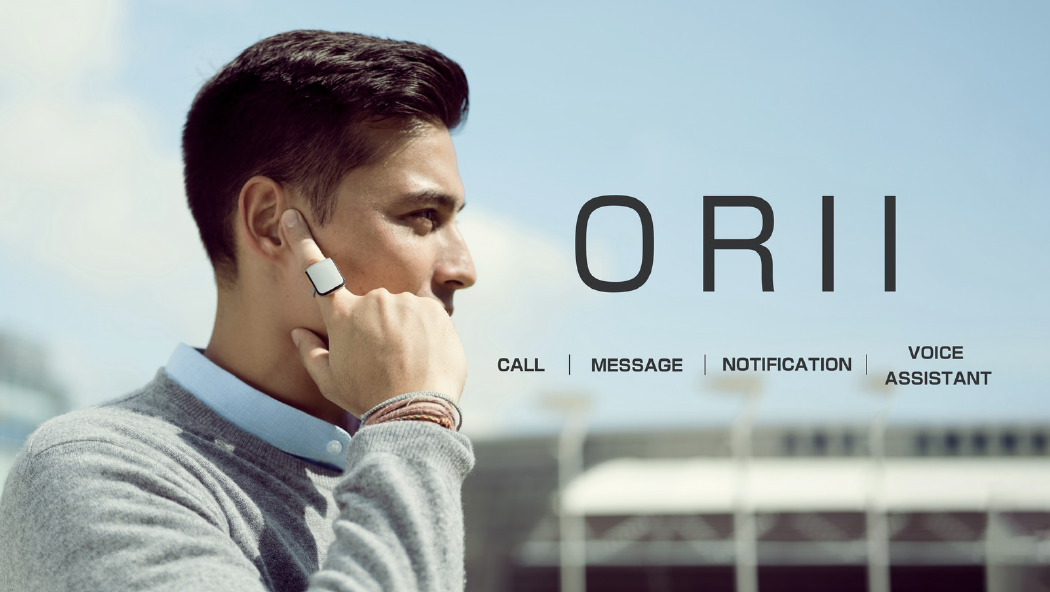 Origami Lab’s Orii Ring
Origami Lab’s Orii Ring
Origami Lab[/caption] 5. Sleep is always a popular subject, and this year we’re seeing no shortage of devices, trackers and monitors at CES. Dream Band claims its headband can help people who have trouble sleeping using a combination of data analysis and vibrations. The Dream Band is a fabric-covered band that wraps around your head and uses a combination of sensors to track various biometrics. These include things such as your heart rate and respiration. Once the sleep data are analyzed, the device communicates cognitive and breathing techniques such as soothing audio to help your brain relax. The sleep data are analyzed to provide coaching programs and sleeping technique tips. The device is currently available only for pre-order and has raised about €31 million in funding led by healthcare company Johnson & Johnson’s venture capital arm. [caption id="attachment_59018" align="aligncenter" width="1014"]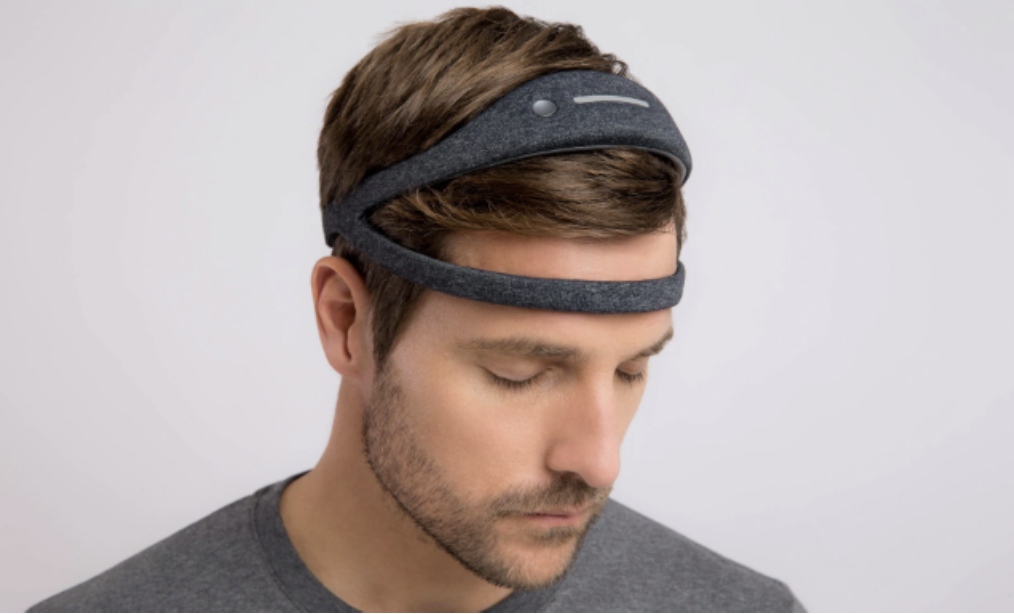 Dream Brand Sleep Wearable
Dream Brand Sleep Wearable
Source: Telegraph.co.uk[/caption]
 Temi Robot
Temi RobotSource: Temi[/caption] 2. Flint Rehab, a neuro-rehabilitation device company, unveiled a new wearable product called MiGo. MiGo is a wearable activity tracker specifically designed for stroke survivors. Strokes are one of the largest causes of adult disability, affecting over seven hundred thousand people every year, according to the CDC. The device is worn around the wrist, tracking movement patterns to make suggestions to help exercise the wearer’s impaired side as much as possible. The device pairs with an app, which provides activity goals based on the wearer’s movement ability. While most wearable fitness trackers are designed to help people get into shape, MiGo can help stroke survivors regain lost abilities. 3. Techstars hosted a pitch competition that featured several innovative startup solutions. Pix has developed a “smart backpack” that allows you to put customized pixelated electronic images on the back of your backpack. The company launched a crowdfunding campaign to raise $35,000 and ended up receiving over $150,000. Pix believes the product will resonate at festivals, conferences (companies can show their logo), and for consumers wanting to show off their personal style. Users control Pix’s appearance with a mobile app via Bluetooth connectivity. Pix will cost $200 for those who pro-order on Kickstarter and $260 retail. [caption id="attachment_59016" align="aligncenter" width="542"]
 Pix Presentation at Techstars Retail Pitch Event
Pix Presentation at Techstars Retail Pitch EventSource: Coresight Research[/caption] 4. Origami Labs, a company that also participated in the pitch competition, has developed a smart ring wearable that answers phone calls, send and receives text messages and performs commands such as asking for the weather or setting a reminder — any task a Siri or Google Assistant could do. Through Bluetooth connectivity, the ring connects with the wearers smartphone allowing you to use your smartphone’s built-in voice assistant. The user places their ringed finger to their ear to either speak or listen, essentially functioning like a wireless earbud. The ring, called Orii, alerts the wearer with a vibration, then you listen by raising your finger to your ear. The Hong Kong-based startup launched in late 2017, raised $500,000 in crowdfunding, $2.5 million in funding and has sold 10,000 units at a price of about $100 per ring. [caption id="attachment_59017" align="aligncenter" width="1050"]
 Origami Lab’s Orii Ring
Origami Lab’s Orii RingOrigami Lab[/caption] 5. Sleep is always a popular subject, and this year we’re seeing no shortage of devices, trackers and monitors at CES. Dream Band claims its headband can help people who have trouble sleeping using a combination of data analysis and vibrations. The Dream Band is a fabric-covered band that wraps around your head and uses a combination of sensors to track various biometrics. These include things such as your heart rate and respiration. Once the sleep data are analyzed, the device communicates cognitive and breathing techniques such as soothing audio to help your brain relax. The sleep data are analyzed to provide coaching programs and sleeping technique tips. The device is currently available only for pre-order and has raised about €31 million in funding led by healthcare company Johnson & Johnson’s venture capital arm. [caption id="attachment_59018" align="aligncenter" width="1014"]
 Dream Brand Sleep Wearable
Dream Brand Sleep WearableSource: Telegraph.co.uk[/caption]